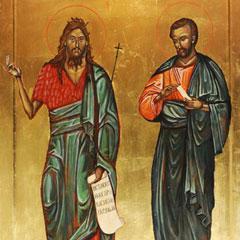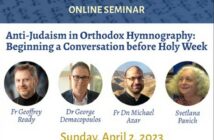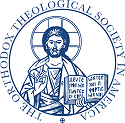 Source: Public Orthodoxy
Source: Public Orthodoxy
by Very Rev. Dr. Nathanael Symeonides and Gayle E. Woloschak
The document, “Mission of the Church in the World,” was released in preparation for the upcoming Holy and Great Council to be held in June (during the Feast of Pentecost) on Crete. This document relates to areas of great significance for problems in the world today—technology, war, discrimination and human dignity, globalization, the influence of the media, and others. Each of these topics is far-reaching with little readily available literature directly related to these issues in the Church Tradition and in Patristic texts; as such, this document could provide much needed guidance. In its present form, however, it does not adequately do so.
The document appears to be a statement of the Church’s awareness of difficult issues of the modern world; however, it does very little to address these problems, suggesting that the Church is not called to actually respond to such concerns—just identify them. The tone of the document is quite vague (perhaps deliberately so) and anachronistic (set in a time when science and technology were very different than they are today). Moreover, the document contains numerous statements supposing that the Church is adequately and appropriately fulfilling its mission in the world.
Those areas that address technology, including biotechnology and communications, appear both shortsighted and one-sided. For instance, a statement is made that a scientist should interrupt research when it violates basic Christian and humanitarian values. This comment represents a misunderstanding of how scientific research is conducted. Most discoveries involve the development of new technologies that can be used either to benefit or harm humanity. Rarely, if ever, is a scientist in the position to develop a technology to be used exclusively for harm. Without a proper understanding of science’s methodology, one wonders whether the Church could really refuse new technologies that could cure a particular condition or disease simply because they may, in the wrong hands, be used to advance inappropriate or unethical goals. The line between what is an appropriate use and what is an inappropriate use of technology is often hard to draw. Additionally, there are other statements, including one asserting the Church’s view that the human person is not “defined solely by biological factors,” suggesting that this view is exclusively held by the Church and not by particular disciplines of science. In fact, it is increasingly the case that universities and medical schools have whole disciplines devoted to understanding how non-biological factors (including spirituality) influence a person. The document has a valuable opportunity to affirm the positive potential of such developments from the Church’s point of view.
The document also asserts that, “Research must take into account ethical and spiritual principles, as well as Christian precepts.” One question is how such a statement can be applied, especially in the case of a research institute based in a multicultural and multi-faith setting where scholars of different faith traditions (or even nonbelievers) work together. Of course, following ethical procedures is expected and strictly enforced by institutional review boards (IRBs) and institutional animal care and use committees (IACUCs); in fact, courses on how to conduct research in an ethical manner are mandated before research can begin. In diverse settings, the expectation that spiritual and Christian principles will prevail is impossible, although certainly Christian scientists can (and often do) call upon colleagues to be respectful of such thinking; common ground on these issues can often be found with scientists coming from different faiths. If the Church wishes to outline the significance of Christianity for scientific research, it may be more effective to dedicate a conference or a series of discussions/papers on the topic rather than a few lines in a brief document with a serious agenda. This would not only be useful to scientists who take their Christian faith seriously, but to many non-Christians who might be inspired and search for ways to apply these principles to their own research.
In the section on mass media, the document states that the mass media is a tool for liberal globalization and consumerism, yet it fails to mention the use of mass media as a tool for war machines and political agendas. In addition, the discussion one-sidedly presents the mass media only as an enemy that must be resisted (even fought against). It does not acknowledge the benefits of the mass media. We encourage the bishops to consider including mention of humanity’s improved ability to communicate across the globe, and especially mass media’s usefulness in helping to deliver aid in a timely manner to those areas experiencing humanitarian crises. In addition, we would like to see the document recognize how the mass media enables non-militant, media-savvy citizens, to organize peaceful protests against persecution and all forms of injustice in society.
Opportunities to expand and balance the document’s approach may also be found in the section on discrimination. The document lists a number of qualities of human life, including, “color, religion, race, gender, ethnicity or language,” and states that the Church rejects discrimination on any “of the aforementioned reasons since these presuppose an intrinsic difference between people.” While the document attempts to be concrete and specific with regard to discrimination, it fails to recognize a number of other possible areas of discrimination in society today, including: illness, disability, age, and sexual orientation. Without a more comprehensive list, or at least a general statement that the Church rejects all forms of discrimination, one is left wondering if the Church might actually condone discrimination in certain instances.
In conclusion, while this document attempts to take a pastoral approach to the work of the Church, we find that it demands far too little of the Church in terms of the careful attention the Church must continually give to the world’s problems and new developments. Even worse, the document at times seems to suggest that the Church’s mission in the world is a fait accompli and not an ongoing effort to transfigure the world.
Fr. Nathanael Symeonides is Direct of Inter-Orthodox, Ecumenical, Interfaith and Church-World Relations for the Greek Orthodox Archdiocese of America.
Gayle Woloschak is Professor of Radiation Oncology and Radiology at Northwestern University’s Feingold School of Medicine and Adjunct Professor of Religion and Science at the Lutheran School of Theology, Chicago, and at the Pittsburgh Theological Seminary.


